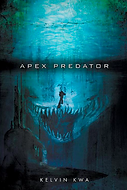Episode 63 S2-28
Healing Power of Story Telling
Featuring:
Special Guest:
Without Land Ch 28
~Kelvin Kwa~
As Without Land continues: Cole questions Erika relentlessly about her past and how she survived the disaster. Erika hates reliving her history each time she tells the story. Here to discuss how creating, telling and listening to stories can have a healing effect is Kelvin Kwa, author of Apex Predator.
%20(1800%20x%20720%20px)%20(2600%20x%20720%20px)(3).png)
Download Day After Disaster for FREE!
One week commercial-free access to the audio drama, access to the Changing Earth Archives, behind-the-scenes clips, and more!
Kelvin drew his inspiration for writing his story from a desire to digest a certain type of information. He loves sci-fi stories and was looking for a specific type of story. When he did not find it, he started writing his own story about a sea monster and the military activity surrounding this creature.
Kelvin explains that there are many emotional benefits to creating a story. There is a certain personal satisfaction in the story's creation and a therapeutic experience to reading and writing. Kelvin, like myself, even enjoys reading his own work and often feels amazed that he wrote it. Also as an author it gives you a chance to live vicariously through the reactions of your readers. It is extremely gratifying when your audience loves your work.
Kelvin is not sure of specific medical research that would validate his findings but his experience, having been married to a physiologist, is that it is hard to change someone's outlook on life or "what's in their heart" by explaining facts and figures to that individual. What you can do is share your stories or stories of others and how other individuals have healed after having a similar experience. Your story is your testimony to facts and how you were affected by them. The story doesn't have to be about you. As fiction writers or story tellers, the creator can make a character similar to a hurt individual that the hurt individual can connect emotionally to and invest into. Once they make this investment, the reader sees themselves as characters, or heroes and they can take the steps with the hero to heal with the character. "We are each one of us the heroes in our own story," in the telling and listening of our own story.
It is important to tell your story and understand those of others. Before writing his book, Kelvin wasn't sure if he could tackle such a feat. He often looked at others and wondered how it was possible. But even the longest journey starts with a single step. Even if your story doesn't make sense, keep writing. Put yourself in a place where the story forms itself and your brain can work comfortably. Don't give up!
Sharing is Caring!

Follow us on social media to discuss the novels, audio drama, and latest podcast takeaways.


~Kelvin Kwa~

Kelvin Kwa is a Microsoft certified professional with a diploma in computing and applied physics. His love of technology, mythology and fantasy has led to years of collecting and reading. Kwa is a husband and a father living near Melbourne, Australia. “Apex Predator” is his first book.



%20(1800%20x%20720%20px)%20(2600%20x%20720%20px).png)











